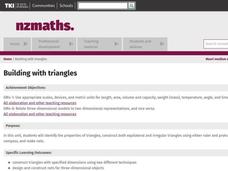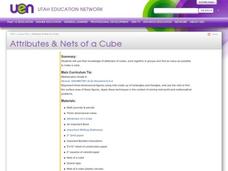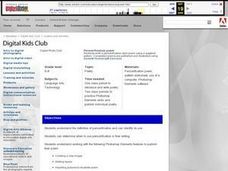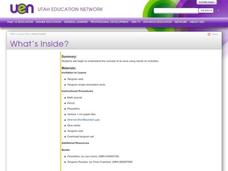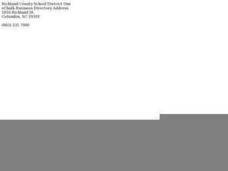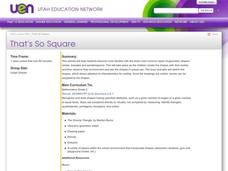Curated OER
Gases, Liquids And Solids
Learners investigate how gases are different from solids and liquids and that they can evaporate and condense. They observe water boiling in a teapot and discuss what happens when the steam touches a cold window, complete an online Heat...
Mathed Up!
Simple Perimeter, Area, and Volume
Young mathematicians find the area and perimeter of shaded shapes on a grid of unit squares. The sheets challenge class members to find the volume of various solid prisms. Each questions also includes the total value of suggest points...
EngageNY
Truncated Cones
Learners examine objects and find their volumes using geometric formulas in the 21st installment of this 25-part module. Objects take the shape of truncated cones and pyramids, and individuals apply concepts of similar triangles to find...
Curated OER
Dihedral Figures
Middle and high schoolers perform transformations. For this web based lesson, students explore dihedral figures. They use the web tools to translate, rotate, and reflect figures. Pupils identify lines of symmetry.
Curated OER
Copy Cat
Learners examine a Webmath page, and demonstrate how to copy and paste. They create a computer-generated template page presenting the attributes of two- and three- dimensional shapes.
Curated OER
Sort it Out
Students identify and sort a variety of two- and three-dimensional objects and compare and contrast their attributes. They identify shapes, locate shapes on the faces of solids, sort real objects and explain the sorting rule, and...
Curated OER
Our Geometric World
Third graders explore the attributes of polygons. In this geometric shapes lesson, 3rd graders review quadrilaterals, squares, rectangles, triangles, pentagons, hexagons, and octagons in order to create hanging polygons. Students then...
Curated OER
How many edges do I need to cut in order to open a cube?
Students problem solve to open a cube to create different shapes. In this problem solving lesson plan, students are given a cube and the shapes to open it up to, and they have to cut the cube open to make certain shapes. This gives them...
Curated OER
Where has Polly Gone?
Students explore polygons and their uses in careers. They also discover polygons shapes in manmade objects and nature. They use their acquired knowledge to construct a strong structure using polygon shapes.
Curated OER
Shapes are Everywhere
Second graders gain an understanding of geometric shapes and spatial reasoning. They learn the attributes of solid shapes in everyday activities. Students compare geometric shapes to everday objects, finding things that serve a purpose...
Utah Education Network (UEN)
Candies R Us
A box is fun to make, especially when it's a candy box! These activities help to cement understanding of the difference between surface area and volume. Have individuals measure the surface area of their box in two-dimensions before...
Curated OER
Building With Triangles
Fourth graders use two different techniques to construct triangles with specific dimensions. They determine how to construct nets for three-dimensional objects focusing on those made with equilateral triangles. They are able to name the...
Curated OER
Measurement-A Common Language: Volume
In this volume worksheet, students take notes on the various ways to measure volume depending on if the substance is liquid, an irregular shaped solid, or a regular shaped solid.
Curated OER
Mandalas, Polygons and Symmetry
Students create a geometric pattern using mandalas, polygons and symmetry. In this geometry lesson, students analyze the mathematics involved in making the mandalas, including the shapes and symmetry. Students create their own mandalas...
Curated OER
Attributes & Nets of a Cube
Third graders engage in a lesson that focuses on the attributes and forming of a cube. They construct a cube using different combinations while comparing a square with only two-dimensions. Students fold paper while following the...
Curated OER
Addendum to the Written Curriculum: Measuring Solids
Students use standard rulers to measure the length of common classroom items - such as pencils, books, desk tops - in inches and centimeters, and measure weight in pounds. They also answer math questions, such as "How long is the front...
Curated OER
Visualizing Solids of Revolution - Washers
Students solve the area of a cross section. In this calculus lesson, students solve areas rotated and bounded by two functions. They solve using the washer method.
Curated OER
WS 7.1 Kinetic-Molecular Theory of Gases/Pressure
In this kinetic molecular theory worksheet, students summarize the points of the kinetic molecular theory, they answer questions about pressure, and draw diagrams to show how suction cups, drinking straws and barometers work.
Curated OER
Personification Poem
Students write a personification poem and identify its use. They make a pattern worksheet and then use Photoshop Elements skills to illustrate their poem. Students use layer styles with the text to highlight the poetry.
Curated OER
Area
Students use different shapes that represent tangrams to determine the area of a space. In this area lesson plan, students trace shapes and have their partners determine the area of that shape.
Curated OER
Study Buddies - Bar Graphs
For this data collection worksheet, young scholars work with a partner to make 3 small bar graphs after finding the proper number of circles on the first page. They look at a page of a variety of shapes and separate the circles into...
Curated OER
Surface Area of Rectagular Prisms
Sixth graders investigate the area of polygons. For this geometry lesson, 6th graders calculate area of prisms using geometric formulas. They work with prisms and other rectangular shapes.
Curated OER
Effect on Surface Area and Volume
Students identify the effect the change of dimensions causes for the volume and surface area. In this geometry activity, students compare perimeter, area and volume as they play around with the dimensions of the polygons. They discuss...
Curated OER
That's So Square
Second graders are introduced to circles, triangles and parallelograms. As a class, they create the shape with their bodies and are shown the shapes in their actual size. To end the instructional activity, they sketch each shape and...













